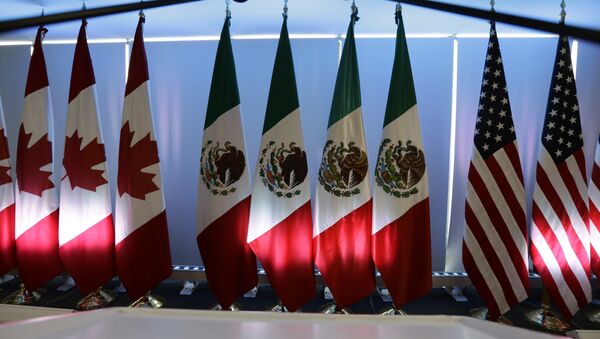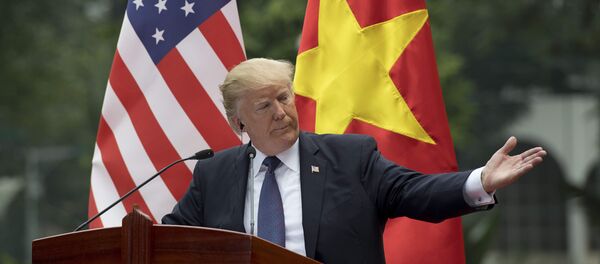Kristian Rouz – The fifth round of NAFTA talks opened Friday, and almost instantly sparked complaints of US inflexibility, as the Trump administration seeks to cut and reverse the US trade deficit by any means necessary. The negotiations are at risk of coming to a complete halt as of Sunday as no breakthrough has been achieved over the weekend, putting the fate of the trade bloc into question.
A deal to update and extend NAFTA must be reached before March 2018, otherwise, the trade pact will be unilaterally terminated by the US. The end of NAFTA would pose significant challenges for the Canadian and Mexican economies, enjoying a substantial presence in the US consumer and raw materials markets.
READ MORE: From the 'Rhetorical' Wall to NAFTA, Mexico Has Always Prioritized Trade With US
President Trump has repeatedly said NAFTA is killing US jobs and contributes to the trade deficit, as many US-based enterprises moved their facilities to Mexico because of the lower labor costs and looser regulations there, subsequently importing manufactured goods back into the US.
"The talks are really not going anywhere," Jerry Dias of Canada’s biggest private-sector trade union, Unifor, said. "As long as the United States is taking the position they are, this is a colossal waste of time."
Canada and Mexico might deem the conditions of NAFTA’s extension, put forth by the US, as less favorable than the termination of the agreement. Trade on the North American continent would not stop beyond that hypothetical point, however, neither Canada nor Mexico would have to open their markets for US goods in exchange for NAFTA’s extension if the agreement ends.
"Our internal view as of this morning is that if any progress is to be made, the United States needs to show some flexibility and a willingness to do a deal," a Canadian negotiator said Sunday.
Canada and Mexico are reluctant to accept the condition of constant renegotiation of NAFTA every five years proposed by the US. Washington policymakers insist economies and the landscape of international trade change roughly twice every decade, meaning it would only make sense to renegotiate the agreement periodically to make sure it still benefits all parties involved.
READ MORE: Despite Rising Data Privacy Concerns, Canadians Ignorant of US Spying Abilities
NAFTA’s junior partners are, however, hardly interested in clauses that would potentially benefit the US, as they see NAFTA as merely a courteous invitation of their companies to the US market, and hardly vice versa.
Mexico, whose economy is heavily dependent on the US, said it is willing to accept the five-year review clause, seeking to preserve at east any possible benefits of access to the US market. However, Mexican representatives oppose the clause, which provides conditions for an automatic termination of the agreement in case of unilateral breach or attempts to tilt its framework in favor of any of the parties.
"We’re going to bring a proposal that every five years we evaluate what has been happening with an agenda of analysis of what effects our agreement has had, and based on this each country can decide what they want to do going forward," Mexican economy minister Ildefonso Guajardo said. "But it wouldn’t have the impact of a sudden death because this would send a bad signal to investors."
Meanwhile, Commerce Department warned time for NAFTA is running out, despite the previous December deadline has been pushed to March. Previously, Canada and Mexico rebuffed the strictest proposal put forth by the US, and Washington decided to give it a second chance.
Commerce Secretary Wilbur Ross says he expects the sides to reach ‘some sort’ of a deal before March for President Trump to review. The US also seeks a review of trade in dairy and cars, as well as new trade regulation.




